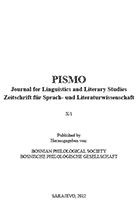Endocentrične sintetičke složene imenice u engleskom jeziku: struktura, klasifikacija i prijevodni ekvivalenti
Endocentric Synthetic Nominal Compounds in the English Language: Structure, Classification and Translation Equivalents
Author(s): Melisa OkičićSubject(s): Language and Literature Studies
Published by: Bosansko filološko društvo
Keywords: sintetičke složenice; prijevodni ekvivalent; deverbativna imenica; imenička sintagma; upravni član; zavisni član
Summary/Abstract: It is well-known that compounding is an extremely productive word-formation process in the English language. In this paper, we discuss endocentric synthetic nominal compounds, viz. compounds whose head word is a deverbative noun (e.g. truck-driver, life-insurance, etc.). In linguistic literature the term synthetic compound is usually linked to the verb argument structure i.e. the fact that the non-head is actually the projection of the complement of the verb. However, the presence of a deverbative noun does not necessarily need to be a guarantee that the non-head originates in the complement, cf. handwritting > * to write hand. Therefore, the main goal of this paper is to discuss a distinction between synthetic and deverbative nominal compounds by focusing on the origin of the non-head, in accordance with the X-bar rules. Also, having in mind that the compounding is of different productivity in English and Bosnian, in this paper we also discuss translation equivalents of endocentric synthetic nominal compounds in order to prove that the most frequent translation equivalent of this kind of compounds in Bosnian is the noun phrase (cf. truck driver/vozač kamiona, life-insurance/životno osiguranje, etc.).
Journal: Pismo - Časopis za jezik i književnost
- Issue Year: 2010
- Issue No: 08
- Page Range: 51-61
- Page Count: 11
- Language: Bosnian

